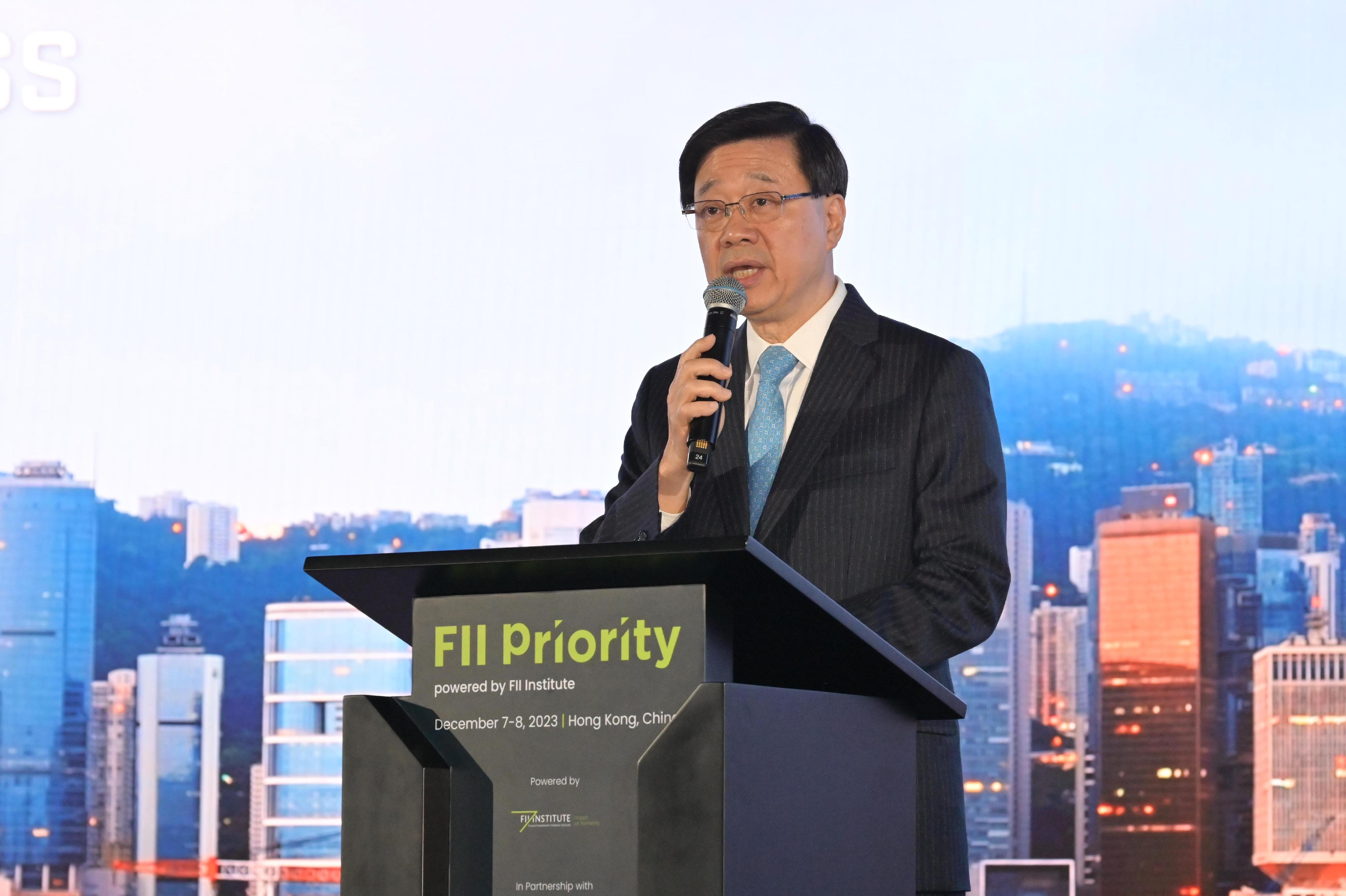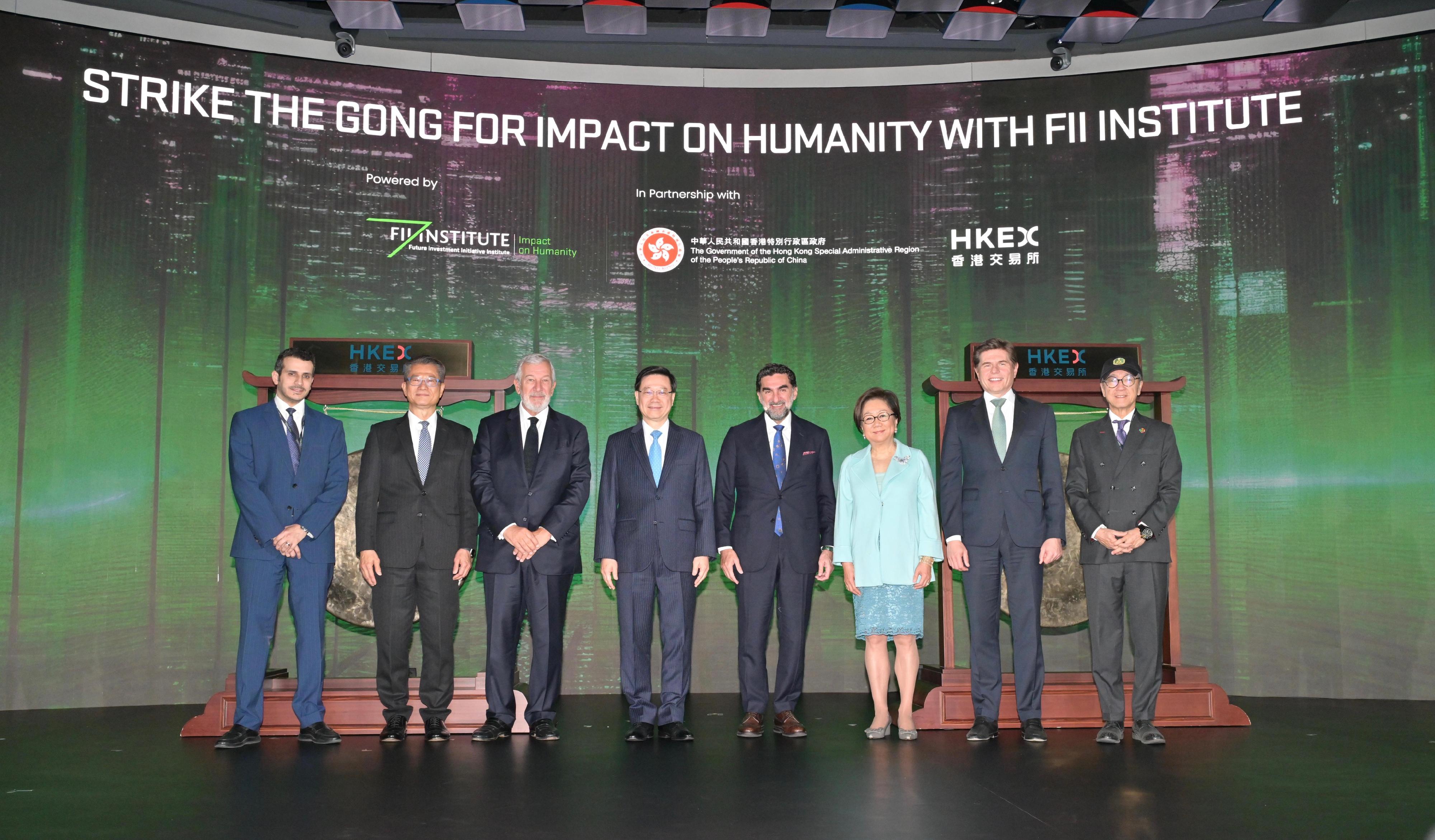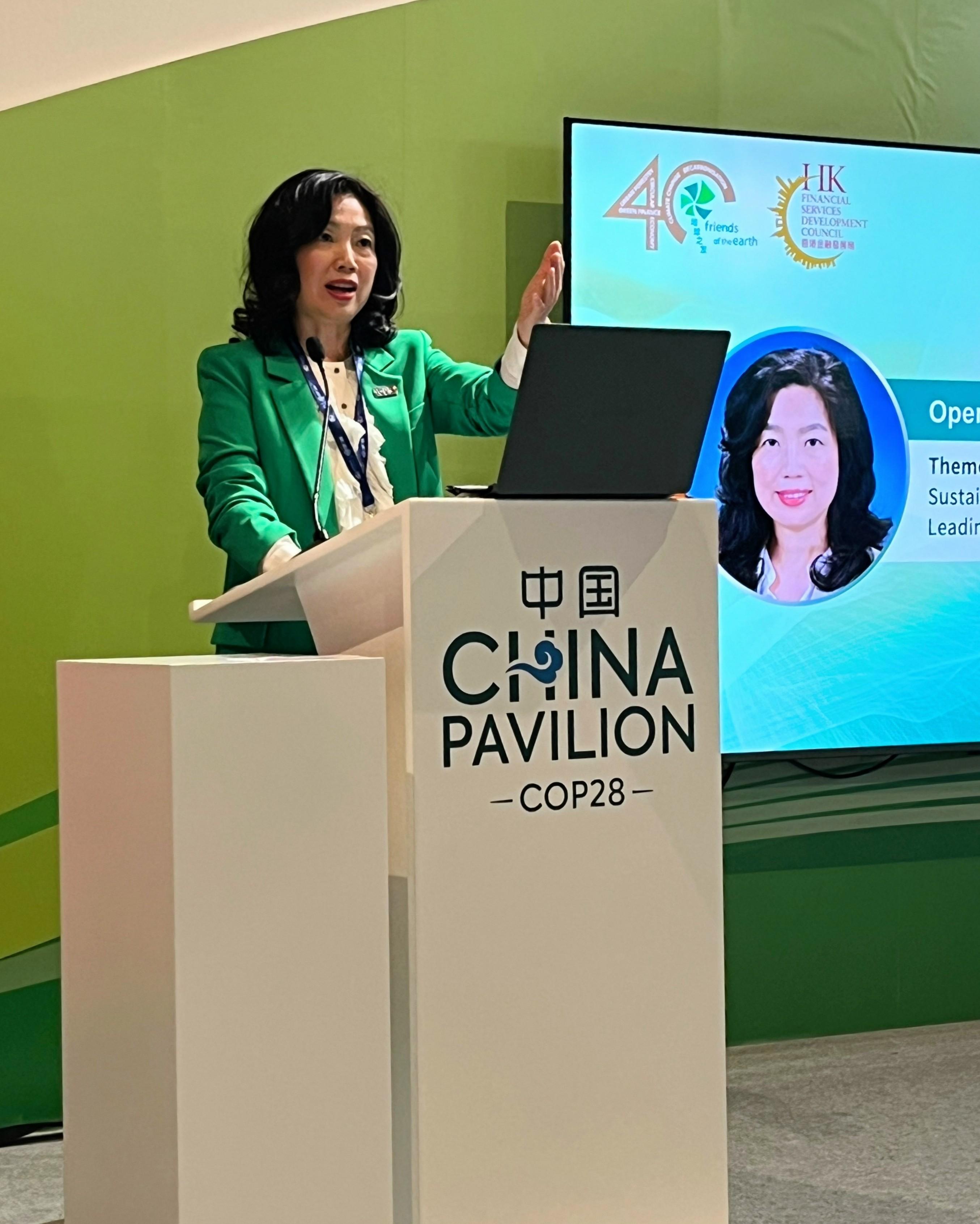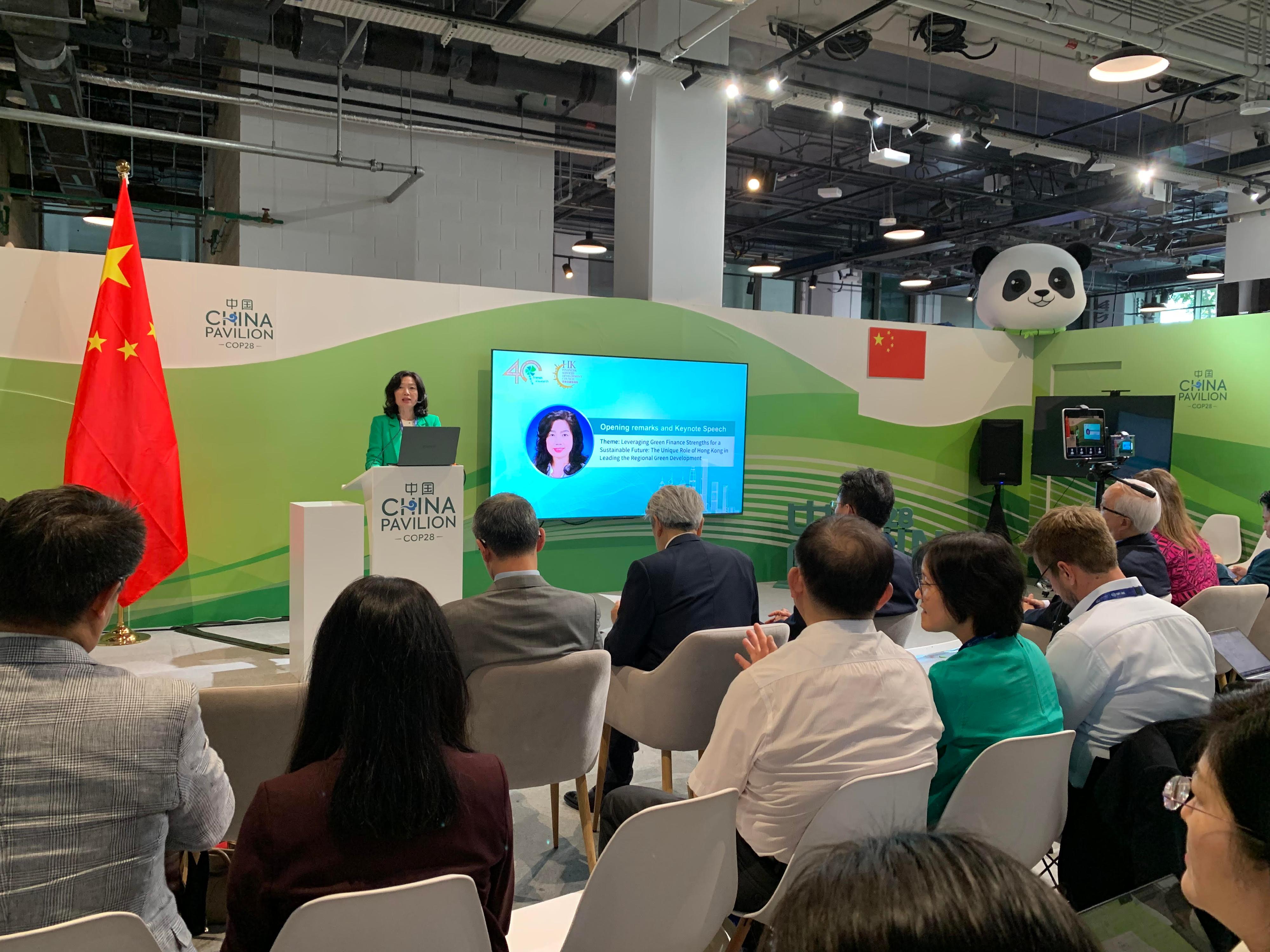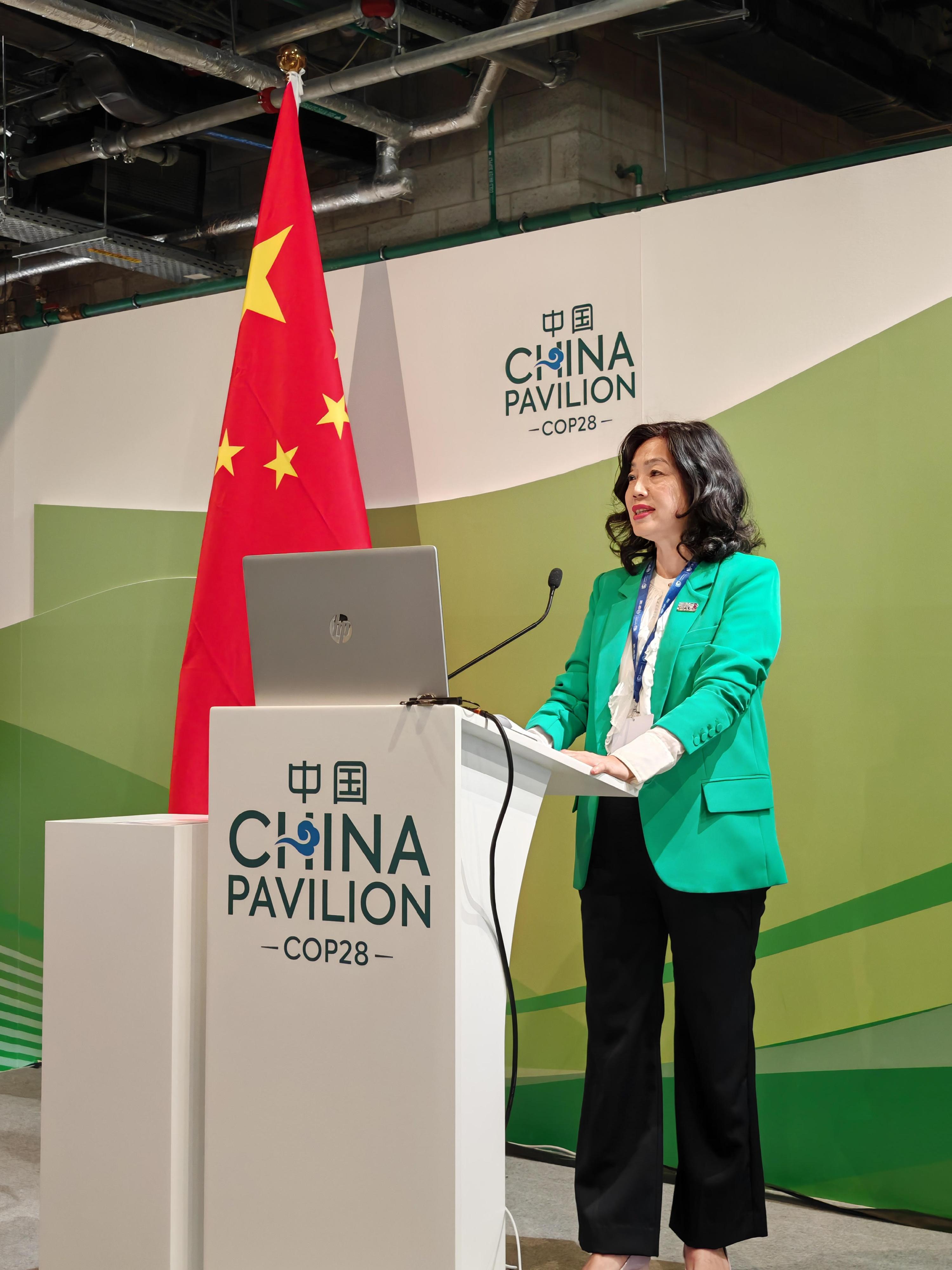Following is the speech by the Permanent Secretary for Financial Services and the Treasury (Financial Services), Ms Salina Yan, under the theme “Leveraging Green Finance Strengths for a Sustainable Future: The Unique Role of Hong Kong in Leading the Regional Green Development” at the China Corner’s Side Event of the 28th Conference of the Parties to the United Nations Framework Convention on Climate Change (COP28) co-organised by Friends of the Earth (HK) and the Financial Services Development Council in Dubai, the United Arab Emirates (UAE), today (December 6, Dubai time):
Secretary Tse (Secretary for Environment and Ecology, Mr Tse Chin-wan), Plato (Secretary General of the Treelion Foundation and Chairperson of Friends of the Earth (HK), Mr Plato Yip), Daniel (Vice-Chairman of the Financial Services Development Council, Mr Daniel Fung), distinguished guests, ladies and gentlemen,
Good afternoon.
It is my great pleasure to join this event on “Hong Kong’s Drive Towards Green and Sustainable Development and Cutting-Edge Innovations” here in Dubai where COP28 is currently taking place. Thank you to Friends of the Earth (HK) and the Financial Services Development Council of Hong Kong for their great job in organising it. Our appreciation also goes to the Ministry of Ecology and Environment in supporting the Hong Kong Special Administrative Region’s participation in this round of COP which has reached a critical moment in determining the way forward for climate change.
Over the past few days, we have heard statements from government leaders, including the one delivered by Vice Premier Ding Xuexiang highlighting the efforts our country has made in promoting green development, advocating multilateralism in accelerating green transformation, and calling for strong actions by parties to implement pledges made. Important pronouncements have also been made including the conclusion of the Loss and Damage Fund, the launch of the Industrial Transition Accelerator driven by the host country, the UAE, and a summit co-led by our country to accelerate actions to reduce methane and other greenhouse gases. On the first ever Health Day in COP28, the Hong Kong Jockey Club Philanthropy Club also pledged to contribute to advance the course of climate change and health as a matter of priority. Naturally all eyes are on the first Global Stocktake to be undertaken during this round of COP, the results of which will tell the world how far economies have progressed towards the goal of net zero.
Immense need of green finance arising from sustainable development
With its ability to make fund flows towards low greenhouse gas emissions and climate-resilient development, climate finance has an important role to play in helping the transition. According to the Asia Securities Industry & Financial Markets Association (ASIFMA), in the next 30 years, the Asian region will require US$66 trillion in climate investment. Where would the funding come from and what would be the capital cost? The financial sector would be part of the solutions by facilitating matching capital funding and quality projects that propel transformation through mitigation and adaptation. And this is precisely where Hong Kong’s distinct strengths as an international financial centre with its dynamic capital markets, deep liquidity pool and diversified product types can contribute as a green finance hub. To give you some examples of our thriving green and sustainable finance market:
(i) As of end-September 2023, there were more than 200 SFC-authorised ESG (environmental, social and governance) funds, with a total AUM (assets under management) of around US$160 billion, representing a year-on-year increase by 36 per cent and 28 per cent respectively;
(ii) Since 2019, we have issued around US$24 billion of green bonds under the Government Green Bond Programme. Our issuances included the longest tenor USD and Euro government green bonds ever in Asia. In fact, last year, the total green and sustainable debt (including both bonds and loans) issued in Hong Kong increased by over 40 per cent from 2021 to reach US$80.5 billion. Among this, the volume of green and sustainable bonds arranged in Hong Kong accounted for one-third of the Asian green and sustainable bond market, topping the chart;
(iii) The Hong Kong Exchanges and Clearing Limited (HKEX) launched an international carbon marketplace, Core Climate, in October 2022, which is currently the only carbon marketplace that offers HKD and RMB settlement for the trading of international voluntary carbon credits. It has recently signed a Memorandum of Understanding (MoU) with the China Emissions Exchange Shenzhen to jointly explore opportunities in cross-boundary carbon market connectivity and climate finance, especially the Guangdong-Hong Kong-Macao Greater Bay Area, or GBA. I will come back to the GBA concept in a minute; and
(iv) Hong Kong is also a global risk management centre with a robust insurance market that can offer a wide array of risk management solutions to organisations and enterprises, providing protection against disaster risks. Shock-absorbing ability is indeed an important part of the transition. For this, we established a bespoke regulatory regime and launched a Pilot Insurance-linked Securities Grant Scheme in 2021. Since then, there have been four catastrophe bonds issued in Hong Kong, with a total amount of about US$560 million, providing protection from losses inflicted by natural catastrophes, such as typhoons and earthquakes.
Hong Kong has already set itself the target to achieve carbon neutrality before 2050 and reduce Hong Kong’s carbon emissions by 50 per cent before 2035. Before other speakers take us through various trending topics concerning the arena of green and sustainable development, I would like to share with you our vision and plans in promoting green and sustainable finance under the four headings of institutional setup, innovation, information and inclusiveness.
Hong Kong Special Administrative Region (HKSAR) Government’s efforts in promoting green and sustainable finance
Institutional setup
On institutional setup, we have set up a high-level Green Technology and Finance Development Committee, chaired by the Financial Secretary, to foster the development of a vibrant green ecosystem in Hong Kong. Areas being looked at include development of green certification and alignment with international standards, promotion of commercialisation of R&D (research and development) outcomes, green finance application and innovation and talent development, etc. At the inter-agency level, the Financial Services and the Treasury Bureau, the Environment and Ecology Bureau and our financial regulators have formed a Green and Sustainable Finance Cross-Agency Steering Group to co-ordinate and formulate specific measures and responses.
Of course, the greatest institutional strength Hong Kong enjoys is the “one country, two systems” arrangement, under which Hong Kong continues to be an open economy buttressed by the common law system while serving as a gateway to the vast Mainland China market. For example, Hong Kong has a high concentration of international banks’ presence while also managing the largest offshore RMB liquidity pool outside of Mainland China, totalling more than RMB1,100 billion. The recently introduced Dual Counter Model allows the issuance and trading of stocks in both Hong Kong dollar and RMB. And green bonds issued by the HKSAR Government have also included tranches denominated in RMB, in addition to USD, Euro and Hong Kong dollar.
As I mentioned just now, Hong Kong also enjoys direct access to the GBA, which comprises nine cities in the southern part of China and the two Special Administrative Regions of Hong Kong and Macao. With a population of over 86 million, combined GDP (gross domestic product) reaching over RMB13 trillion, and diverse and vibrant economic activities, the GBA is a good test bed for green solutions to satisfy the huge demand. One of the Mainland cities in the GBA, Shenzhen, for example, has issued three rounds of municipal government green, blue and social bonds in Hong Kong totalling around RMB10 billion. The Outline Development Plan for the GBA has indeed clearly indicated support for the development of Hong Kong into a green finance centre and a platform for investment and financing serving the Belt and Road Initiative.
Innovation
Turning to innovation, the presence of promising start-ups from Hong Kong in the Green Zone of the COP campus testifies to our innovation spirit and ability. Hong Kong start-ups can offer electricity free cooling coating technology, biomimic tiles for restoring degraded marine system, and equipment and software for collecting carbon emission data in residential or commercial settings for better monitoring and data analytics. In fact, just two days ago, a Hong Kong-based climate technology company was awarded the UAE Techsprint Award at the COP28 “Global Climate Action Through Fostering Sustainable Finance” event for its artificial intelligence solutions in sustainable finance to help entities scale up climate action.
Another good example of green finance and fintech working together is the pilot issuance of the world’s first-ever government tokenised green bond under the Hong Kong Government’s Green Bond Programme in February this year, applying the Distributed Ledger Technology (DLT) to primary issuance, settlement of secondary trading, coupon payment, and maturity redemption. This issuance has demonstrated the feasibility of deploying DLT to real capital market transactions under our existing legal and technological framework, with enhanced efficiency and reduced cost. With this successful first attempt, we are now in discussion with market participants on expanding the DLT use cases, including a second tokenised government green bond issuance.
It makes perfect sense to combine our advantages in fintech with green finance, in building Hong Kong as a green fintech hub. Therefore, as announced by our Chief Executive in his Policy Address in October this year, we will launch a proof-of-concept scheme for the development of green fintech in Hong Kong, with the objective of providing early-stage funding support for pre-commercialised green fintech, thereby expanding the green fintech ecosystem. The figures are in fact encouraging. There are currently around 1 000 fintech companies in Hong Kong with many specialising in the field of green fintech, providing technological solutions on ESG data analytics, ESG reporting preparation, etc. Furthermore, to provide one-stop information on the current status of green fintech companies in Hong Kong and related services, we will be publishing a Hong Kong Green Fintech Map to raise these companies’ profile and enable users to conveniently locate suitable green fintech services for their operations and businesses.
The same innovative spirit is also shown in financial product development. For example, just last week, we saw the first Saudi Arabian ETF (exchange-traded fund) listed in Hong Kong, offering global and regional investors unique Middle East exposure in Hong Kong. We have also put in place a regime for the issuance of Islamic bonds in Hong Kong. I am confident that we will see the demand and supply of green products originating from the Middle East in Hong Kong soon.
Information
Thirdly, on information. Investors are growing ever more mindful of the impact of climate change on their investments, and demand more consistent and accurate information to help them assess which company is building a more sustainable business and putting ESG principles into practice. Many companies also look for a set of global common standards for sustainability disclosures as they would not want to risk having international capital bypass them if they fail to meet investors’ expectation in sustainability disclosures. In this regard, the Stock Exchange of Hong Kong Limited (SEHK) released a public consultation in April 2023 on enhancement of climate-related reporting requirements for Hong Kong listed companies and recently announced that the Listing Rule amendments are expected to be implemented from January 2025. Meanwhile, the International Sustainability Standards Board, or ISSB, published the International Financial Reporting Standards (IFRS) Sustainability Disclosure Standards in June this year as a global baseline of sustainability reporting standards designed to meet investor needs. Hong Kong, as an international financial centre according priority to sustainable finance, will align corporate sustainability-related disclosures with this global baseline. Specifically, we have already set up a working group with financial regulators and key stakeholders to craft a comprehensive roadmap to guide the appropriate adoption of the IFRS Sustainability Disclosure Standards in Hong Kong, taking account of our position on the global green finance map and local circumstances.
Information is also essential to defining what qualifies as “green” and preventing greenwashing practices. In this connection, we are in the process of putting in place a local green classification framework for use across financial sectors, so as to facilitate easy navigation among mainstream taxonomies including Mainland China’s and the European Union’s taxonomies, as well as the Common Ground Taxonomy. The work has been guided by the principles of interoperability, comparability and inclusiveness, with a view to reducing transaction costs by avoiding unnecessary duplication of verifications and potential fragmentation challenges across markets.
We are also keen on promoting information exchange and dissemination. For example, the Hong Kong Monetary Authority (HKMA) has launched a Green Fintech Competition to promote the adoption of green fintech solutions in the Hong Kong banking industry. Winners will be invited to join and host exhibition booths in the Green and Sustainable Banking Conference to be held this month. The Securities and Futures Commission has also hosted a forum on sustainability disclosure to bring together leaders and industry experts to exchange views and information on building an effective ecosystem for sustainability disclosure. Looking ahead, the Government will organise a series of green finance and green tech-related events and conferences in the first quarter of 2024. Stay tuned.
Inclusiveness
Last but not least, inclusiveness. Undoubtedly, combatting climate change needs joint and proactive efforts. The element of inclusiveness is therefore crucial. Recognising the importance of engaging members of the public to directly participate in greening Hong Kong, we have issued two rounds of retail government green bonds totalling HK$40 billion for subscription by Hong Kong residents, which offer investment options with steady returns while enabling participants to join and benefit from green finance. The inaugural issuance in May 2022 was the world’s largest retail green bond issuance then. The proceeds raised are used to finance or refinance green projects that provide environmental benefits. These projects are covered by one or more of the nine eligible categories under our Green Bond Framework, i.e. renewable energy; energy efficiency and conservation; pollution prevention and control; waste management and resource recovery; water and wastewater management; nature conservation/biodiversity; clean transportation; green buildings; and climate change adaptation.
Inclusiveness also covers growing the pool of talent in our green finance industry. To build up the capacity in green and sustainable finance, we launched a subsidy scheme last year to support market practitioners and related professionals, as well as students and graduates of relevant disciplines, to participate in relevant training or accomplish qualifications. As of late November, there are 40 eligible programmes under the scheme and we have approved over 560 applications from individuals taking part in the courses with total subsidy amount of about HK$3.6 million while many are being processed.
Conclusion
Ladies and gentlemen, I am sure you agree with me that together, we have the power to shape the future for the continued existence of humankind. Hong Kong, with its unique and robust institutional setup, is committed to leading the way in green and sustainable finance, fostering innovation, promoting information flow, and embracing inclusiveness for a greener tomorrow.
May our collective efforts serve as a foundation for safeguarding the well-being of planet Earth. With this, I wish the event every success and the best of sustainable business and health for all of you. Thank you.
read more


